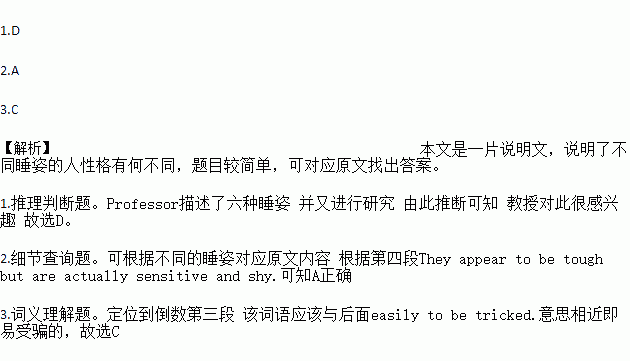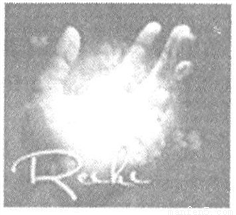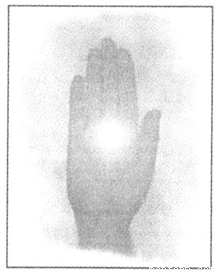题目内容
A scientist believes he has discovered a direct link between people's favourite sleeping position and their personality. Professor Chris Idzikowski has described six different positions and what each one says about a person’s character. The professor, who did the research for a hotel group, said, “We are all aware of our body language when we are awake but this is the first time we have been able to see what our position says about us when we are asleep.” At the moment, Professor Idzikowski is trying to sleep in a yoga position that involves crossing your legs around your neck. He says there is no perfect position for sleeping.
1. THE STARFISH
“Starfish” sleep flat on their back with their arms raised. They are good listeners who make friends easily but do not like to be the centre of the attention.
2. THE YEARNER
“Yearners” sleep on their side with their arms raised. They are doubtful and have a very sensible approach to life.
3. THE FOETUS
The most popular position, particularly among women. They sleep curled(蜷缩)up on their side, holding on to the pillow. They appear to be tough but are actually sensitive and shy.
4. THE FREEFALLER
Only 6.5% of people prefer to sleep on their front, making this the least popular sleeping position. “Freefallers” seem very confident, although this hides a nervous personality.
5. THE LOG
The “log” position is similar to the “yearner” but with arms by the sides. “Logs” are easy-going and sociable, but can be seen as too gullible, easily to be tricked.
6. THE SOLDIER
“Soldiers”, who sleep on their back with their arms by their sides, are quiet and reserved. They set high standards for themselves and do not like noisy social situations.
1.What can we infer from Paragraph 1?
A. The yoga sleeping position is the best one.
B. People don't know their body language when awake.
C. People's sleeping position determines their personality.
D. Professor Idzikowski shows great interest in sleeping positions.
2.Which of the following sayings about the sleeping position is correct?
A. “Foetus” seem to be strong but sensitive.
B. “Yearners” sleep on their back with their arms raised.
C. “Starfish” like to be the focus of the attention.
D. “Soldiers” sleep on their side with their arms by their sides.
3.What does the underlined word gullible mean in Paragraph 6?
A. Easily annoyed. B. Easily approached.
C. Easily cheated. D. Easily satisfied.




 ethods are very effective in the examples that they provide. However, there are some "everyday complaints" such as back pains, headaches, which are treated currently with medicine. When you have a headache, you take an Aspirin; when you cannot sleep, you take Xanax without thinking of the side effects of these. When you use these pills for a long period, you become dependent on them; you cannot sleep without them. We pay huge amounts of money but never get better. How about a safer and more economical way of healing? When doing Reiki to yourself, you do not need anything except your energy so it is very economical. Also, there are no side effects and it is scientifically explained.
ethods are very effective in the examples that they provide. However, there are some "everyday complaints" such as back pains, headaches, which are treated currently with medicine. When you have a headache, you take an Aspirin; when you cannot sleep, you take Xanax without thinking of the side effects of these. When you use these pills for a long period, you become dependent on them; you cannot sleep without them. We pay huge amounts of money but never get better. How about a safer and more economical way of healing? When doing Reiki to yourself, you do not need anything except your energy so it is very economical. Also, there are no side effects and it is scientifically explained.